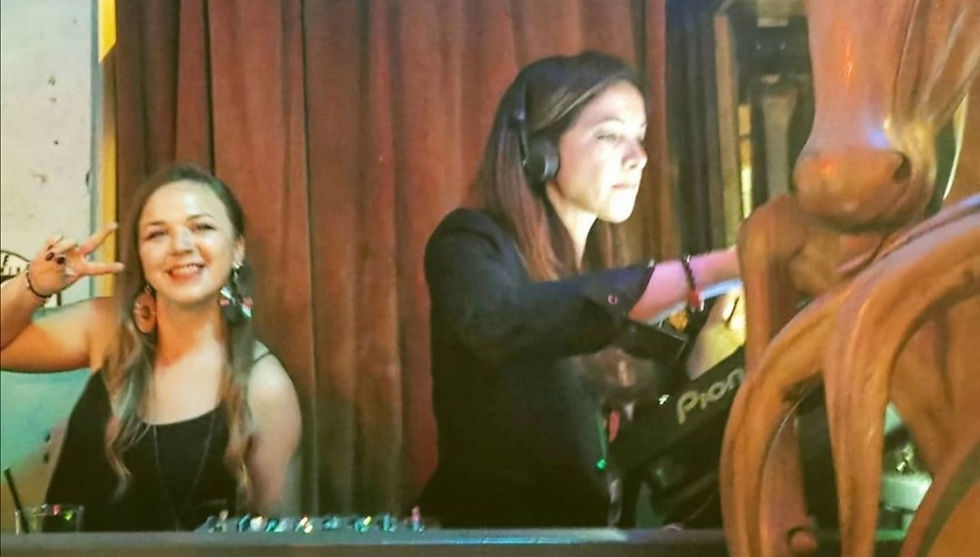5 Misconceptions About Female DJs (and Why They’re Completely Wrong)
- thefemaledjnetwork
- Oct 28, 2024
- 3 min read

The world of DJing is hardworking, fast-paced, and demanding—and it’s evolving rapidly.
Yet, despite the progress, female DJs still face a slew of outdated assumptions. These misconceptions not only misrepresent the talent and skill women bring to the craft, but they also miss the ways female DJs enrich the music scene with their own unique contributions.
Here are five of the most common misconceptions about female DJs—and why it’s time to leave them behind.
1. "Female DJs Are Just Eye Candy"
One of the most pervasive stereotypes is that female DJs are booked more for their appearance than their skills. While looks may help with branding in any industry, focusing solely on appearance dismisses the talent and hard work that many women bring to the craft. DJing requires an intricate understanding of musical structure, equipment, and crowd control. The idea that women are only there to "look the part" not only belittles their skills but also perpetuates outdated ideas about gender and capability.
The Reality: Women in DJing are artists first, with a passion for music and performance. Female DJs like Peggy Gou, Charlotte de Witte, and The Blessed Madonna are breaking barriers by focusing on pushing musical boundaries and creating unforgettable experiences for their audiences.
2. "They Don’t Know Their Equipment"
The assumption that female DJs are less knowledgeable about their equipment is another lingering stereotype. DJing demands a solid technical foundation, requiring proficiency in beatmatching, EQing, layering, and effects management, not to mention mastering turntables, mixers, controllers, and audio software. This is an art form that combines creative intuition with technical precision—skills that female DJs have honed just as much as their male counterparts.
The Reality: Many female DJs not only know their equipment but have also been instrumental in shaping DJ culture and technique. DJs like Alison Wonderland and Rezz have pioneered their own sounds through technical innovation, proving that understanding equipment isn’t a gendered trait.
3. "Female DJs Can Only Spin Certain Genres"
There's a common belief that female DJs are better suited for certain "lighter" genres, like pop, or disco, as opposed to heavier styles such as techno, drum & bass, or dubstep. This stereotype limits the perception of women’s versatility in music, as well as undermines their ability to master a range of styles.
The Reality: Female DJs are found across the entire spectrum of genres. Take Charlotte de Witte, whose intense, high-energy techno sets have cemented her as one of the genre’s leading figures, or Maya Jane Coles, known for her work in both deep house and hip-hop. Genre mastery is about passion and dedication, not gender.
4. "They Only Got the Gig Because They’re Female"
There’s a troubling notion that female DJs only get booked to fulfill diversity quotas rather than based on talent. This misconception suggests that being a woman in the DJ industry is an automatic advantage, which couldn’t be further from the truth. In reality, it’s still challenging for women to break through, particularly in high-profile events or male-dominated music circles.
The Reality: Female DJs often face greater scrutiny and have to work harder to prove themselves. The idea that their gender is the reason for their success overlooks the hard work, hours of practice, and resilience needed to succeed in such a competitive field. Gender diversity in line ups benefits the industry as a whole, creating a richer and more inclusive musical experience for everyone.
5. "They’re Not as Serious About Music as Male DJs"
The misconception that female DJs are somehow “less serious” about their music implies that they treat DJing as a hobby rather than a legitimate career. This idea is both patronising and uninformed. Many female DJs dedicate countless hours to perfecting their craft, curating unique selections, and creating original mixes to connect with their audiences.
The Reality: For countless female DJs, music is a lifelong passion and profession, not a side gig. Artists like Honey Dijon and Nina Kraviz have built international reputations by immersing themselves fully in music, constantly pushing creative limits and engaging in the scene as innovators and influencers.
Closing Thoughts: Celebrating the Talent of Female DJs
The DJ industry still has room to grow when it comes to fully embracing and appreciating the contributions of women. But with each passing year, more female DJs are earning respect and recognition on their own terms. By breaking down these misconceptions, we allow the music scene to evolve into a more inclusive space that celebrates talent and diversity in equal measure. Let's give female DJs the credit they deserve for the skill, passion, and artistry they bring to the table.
The next time you catch a female DJ on the decks, know that she’s there because she deserves to be.





Comments